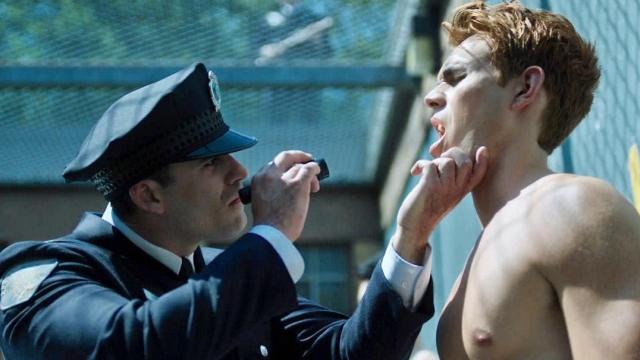In Riverdale’s third season, Archie Andrews (K.J. Apa) got himself thrown in the clink after deciding to plead guilty to a murder he didn’t commit. Though the choice was meant to demonstrate the lengths Archie would go in order to spare his loved ones, it ended up becoming Riverdale’s excuse for veering further into fanfic territory as the series became the CW’s attempt at Oz for Gen Z.
Though it’s been some years now since Apa’s Archie was longing to be free from kid jail (that’s just what the show was about at the time; now in its fifth season, it’s since moved on), the actor still feels trapped to a certain degree by the confines imposed on him by the show and its fandom. In a recent interview with Demi Moore for Interview magazine, Apa expressed how free he felt working on his new film — Michael Bay’s covid-19 thriller Songbird — compared to Riverdale, which he likened to a kind of prison because of the strict rules he has to follow regarding the way he comports and presents himself.
“There are so many restrictions on what I can and can’t do,” Apa said. “With this character, it was like, ‘Wow, this is what it’s like to really express myself in a natural way.’ I wasn’t covered in makeup or hair products. I had long hair and a beard. I just felt free.”
Actors changing their physical appearances to embody comic book characters isn’t anything new or particularly unique to Apa’s experience, of course, but he went on to explain that there are times where he feels as if his co-stars are some of the only people who can understand where he’s coming from. Like many stars at the centre of franchises with massive fanbases, Apa sometimes struggles with the way fans have difficulty accepting the reality that he and Archie Andrews aren’t the same person.
Much as the actor appreciates the support Riverdale’s fandom provides to the show and his career — ”I try and look at it from a fan’s perspective to understand the way they think. But there are times when I’m like, “Wow, they really have no idea that we are actual people. They can’t separate us from our characters,’” he said — he insists that the pressures he experiences are especially taxing because of how people infer things about his personal life in ways they don’t necessarily do for people working in other professions.
“You don’t dissect the life of a builder and start judging the decisions he makes in his life with his wife and kids,” Apa said. “As an actor, I will be judged on everything: my political opinions, my opinions on drugs, my opinions on the people I want to be with. Everything. It’s something I’ve had to come to terms with.”
[referenced id=”1220714″ url=”https://gizmodo.com.au/2020/06/riverdale-actors-speak-out-on-the-shows-treatment-of-black-characters/” thumb=”https://gizmodo.com.au/wp-content/uploads/2020/06/04/tncqu41p6eyp3zzoxrhg-300×168.jpg” title=”Riverdale Actors Speak Out on the Show’s Treatment of Black Characters” excerpt=”issues to light.”]
Apa’s argument that fans need to learn how to separate their feelings about fictional characters from the actors who portray them on screen is well made and something that fandoms need to get better about internalizing. His statements about how actors’ behaviour is interpreted are also worth mulling over because they come at a time when people like The Mandalorian’s Gina Carano have raised questions about what happens when an actor becomes the centre of a widely publicized controversy.
In Carano’s case, Disney’s decision to no longer work with the actress after, among other things, she posted an anti-Semitic message to her social media, is a rather straightforward example of an employer severing ties with an employee who decided to use their platform to spread harmful messages under the auspices of political conservatism. What many of Carano’s defenders have claimed is that the repercussions she faced are a sort of signal that Hollywood as an industry is becoming more hostile towards conservatively aligned people as a whole.
This is something that anyone paying the tiniest amount of attention to the industry knows to be a ridiculous position to take, given the continued success of conservative and/or religious performers like Guardians of the Galaxy’s Chris Pratt — and Apa himself, who identifies as a Christian and is quite open about the role his faith played in his coming to star in Songbird (which is itself a faith-based film.) It may come as a surprise to some Riverdale fans that the actor playing Archie — a character with a terminal allergy to clothing — considers his show to be a bit stifling. However, few people are likely to take issue with that fact because the way Apa’s chosen to express his values currently doesn’t come at the expense of other people’s tastes or humanities.
